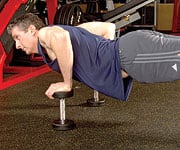Life Extension Magazine®
“I just have a passion for anti-aging medicine,” says Beverly Hills physician Brian Boxer Wachler. Sometimes called the “Guru to the Stars,” he has a rapidly growing roster of celebrity patients. He would love to talk about them; unfortunately, he cannot. “What’s special about our practice,” he says, “is that we have a lot of celebrities. People are always asking us who they are, but we just aren’t able to reveal their names.” However, Boxer Wachler, a highly respected ophthalmologist and LASIK specialist, can talk about successful eye surgery he has performed on celebrities like talk-show host Dr. Phil, actor Tony Curtis, and musician Seal—and he has their accolades to prove it. Now 40, Boxer Wachler studied at Dartmouth, St. Louis University, Edinburgh University, and UCLA. Considered a pioneer in his original field of ophthalmology, he established industry LASIK guidelines to prevent halos and glare, received the Career Achievement Award from the American Academy of Ophthalmology, and was elected by his peers as one of the world’s best refractive surgeons. He is a media favorite, appearing frequently as an eye care specialist on ABC, NBC, CBS, Fox, and CNN. A Move to Anti-Aging MedicineSo why did Boxer Wachler make the transition from a thriving ophthalmology practice (which he still maintains) to anti-aging medicine? Several years ago, after realizing that his patients needed help in maintaining their newly corrected vision, he began to study the growing field of anti-aging medicine, including cutting-edge information provided by the Life Extension Foundation. His quest soon led to formal study, a diploma from the American Academy of Anti-Aging Medicine, and the founding of the Institute of Optimal Health. The Institute’s program is divided into the “four pillars” of diet, exercise, hormonal rebalancing, and supplements. “We’re different,” Boxer Wachler explains, “because we practice anti-aging medicine with a personal touch. I meet with everyone who comes in and together we tailor an individual plan for each person’s specific needs. I’m also involved in all the follow-up care.” His overriding aim is to help his patients meet their unique goals. “For some,” he notes, “it’s just to make sure that as they get older, they can maintain a high quality of life, keep up their energy level, stay healthy, work out, enjoy their families and favorite activities, travel, and basically just feel good.” For others, the goal often means reversing health problems that have developed over time. “The human body is programmed to start declining after about the age of 21,” says Boxer Wachler. “That’s when we see the hormones start to go down. What we want to do is address some of those internal changes, so people can retain the youthfulness they had in their twenties when they’re in their fifties, sixties, and beyond.”
A Comprehensive Care RegimenAlthough Boxer Wachler occasionally sees younger patients who may have severe hormonal imbalances, the vast majority of his anti-aging patients are over 40. What can a typical new patient expect when coming to the Institute of Optimal Health? First, patients are asked to complete a questionnaire about their health history, current medical problems, and the drugs and supplements they take. This is followed by a physical examination and interview, in which Boxer Wachler meets with patients to discuss their individual goals. Blood tests are then used to measure all major hormones and to assess cardiovascular risk factors. “We look for heart disease,” the doctor explains, “because it is still the number-one killer of both men and women. We examine biomarkers—not just cholesterol, for example, but also C-reactive protein and homocysteine—since they have been shown to correlate much more tightly with heart disease than do cholesterol levels.” The next step is reviewing test results with the patients and assessing their current diet, supplement use, and exercise habits. At this point, Boxer Wachler develops an individualized program incorporating recommendations for diet, supplements, and exercise. “If the hormones are not in balance,” he adds, “we will be replacing and optimizing them.” A follow-up visit approximately one month later includes another series of lab tests to reassess hormone levels and determine whether further adjustments are needed to get them into perfect balance—that is, within the optimal range of a person between the ages of 20 and 30. After that, a maintenance follow-up appointment is scheduled every six months. “I think Life Extension has done a lot to help educate people about hormone replacement,” he says. “But the press has often failed to distinguish between synthetic hormones and the bioidentical hormones we use in our practice. The synthetics or pharmaceuticals are by definition altered because they can be patented, whereas bioidentical hormones are produced from natural substances by compounding pharmacies. As far as safety is concerned, there are some nuances or possible minor side effects, but when levels of bioidentical hormones are adjusted properly, they are safe. I’m not aware of any studies that have found any serious health problems with them.” A Strong Advocate of SupplementsWhen it comes to supplements, the doctor has some very specific advice. “It is so important to take the right supplements to reach optimal health,” he states. Boxer Wachler advises patients to take capsules made of vegetable materials (which are usually better absorbed), chelated minerals, and companies that use the best ingredients. “One thing about Life Extension is that they have a very longstanding history of being leaders in the supplement field, always using the highest-quality ingredients,” he says. He cites as an example the purity of Life Extension’s Super Omega-3 product: “For years, I’ve been eating salmon and taking fish oil products. When increasing mercury levels began showing up in fish oil supplements, I had myself tested and found that my mercury level was elevated.” Using chelation treatments, he reduced his mercury level, and is now careful to use and recommend only mercury-free fish oil supplements. While discussing caloric restriction, a practice Boxer Wachler describes as “the only treatment experimentally proven in animal studies to extend life span,” he praises Life Extension’s Natural Appetite Control formula for decreasing hunger. He notes studies demonstrating that calorie-restricted animals generate fewer free radicals and display less heart disease, cancer, diabetes, and Parkinson’s disease. Boxer Wachler says he looks forward to the day when results from human studies of caloric restriction will be available. As for today, however, Boxer Wachler thinks our focus should be on the glycemic index. He maintains that “the single most important aspect of diet is understanding the glycemic index. People with relatively high-glycemic diets gain weight and store glucose in their tissues, which damages proteins in the body.” This damage hastens the aging process, resulting in a variety of health problems, particularly diabetes. “People with diabetes age at a highly accelerated rate,” he explains, “because the sugars are damaging their tissues, and they have early heart attacks, vascular disease, kidney disease, eye disease, and strokes. Everything occurs so much faster and earlier with diabetes, and it’s because of the glucose.” Putting Philosophy into PracticeBoxer Wachler says he has always taken care of himself in terms of diet, exercise, and supplements, but was surprised a while back to realize he had gained 40 pounds since his college days. He began to carefully follow his own anti-aging program, modifying his diet, avoiding high-glycemic foods, taking more supplements, and assessing his hormonal levels, then adding thyroid, DHEA, testosterone, and melatonin to his regimen. The results have been dramatic. “I began shedding those 40 pounds and now I’m back to my college weight,” he says. “I don’t get tired at the end of the day. I used to fall asleep watching TV every night, I was exhausted. Now I’ve got the energy I used to have years ago.” As the father of nine-month-old twin girls, he certainly needs that youthful energy. “I come home and I can play with them,” he says. “I’m not feeling tired.” A lifetime exercise enthusiast, Boxer Wachler was on championship rowing crews in college. Today, he regularly works out with the ergometer (an indoor rowing machine) and also trains at Gold’s Gym. He recently entered an indoor rowing competition, involving the standard test of trying to row 2,000 meters in under seven minutes. He was able to accomplish the task, something he had not done since his college years. Another pastime is restoring “muscle cars.” He is currently working on a 1971 Dodge Charger. “I like getting them back to the original state,” he says, adding that it is hard to ignore the parallel between restoring human bodies in his anti-aging practice and bringing back these old cars.
One surprising bit of information is his choice of Benjamin Franklin as a personal hero. “I look at Franklin as being one of the first anti-aging advocates in history,” he explains. “He knew the effects of overeating or what was then called ‘gluttony,’ and recognized that it was associated with disease. Franklin also advocated exercise and swam a lot in his youth. He even calculated the benefits of various types of exercise. And he lived to about 84 at a time when life expectancy was about half that, so he had quite an impact on health studies back then.” Boxer Wachler would certainly like to have a similar impact. “I think the most important thing for anyone to do is learn,” he says. “There is so much information out there now and people can take charge of their health, even if they don’t have access to an anti-aging physician.” In that regard, he praises Life Extension magazine, which he recommends to patients for its well-referenced, scientifically validated articles that bring a high level of credibility to this relatively new field of study. “People should be open to learning, and learning beyond the mainstream,” he says. “Mainstream physicians don’t really get involved until disease and pathology are present, and sometimes, at that stage, it’s unfortunately too late.” Dr. Boxer Wachler’s personal supplement and medication list:
|



